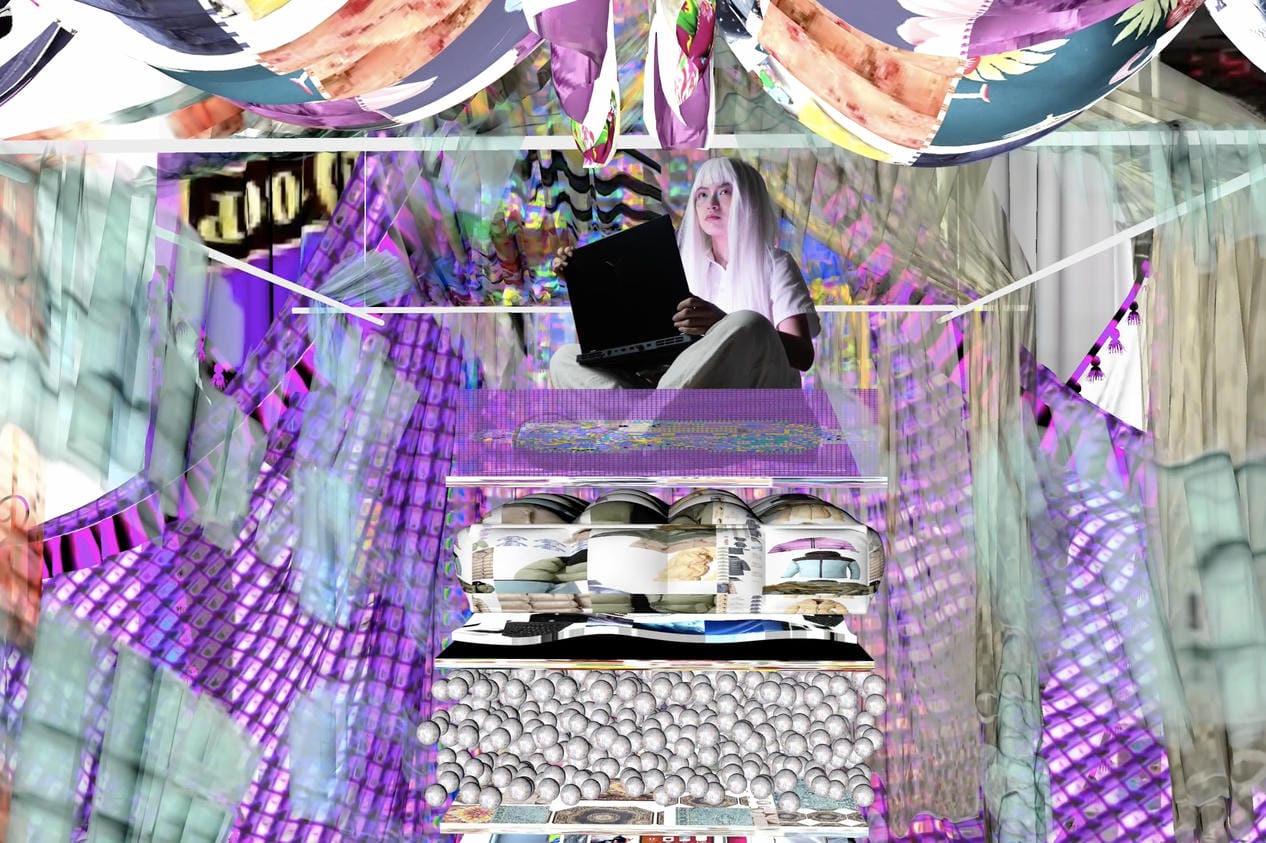Byung Chul Han has argued that twenty-first-century society has shifted to what he calls an ‘achievement society (Leistungsgesellschaft)’, departing from Foucault’s disciplinary society.1 According to Han, the achievement society chases endless productivity and engraves the drive to maximise production in the social unconsciousness. The result is a loop of self-responsibility, leading individuals to voluntarily work and perform, thereby allowing for auto-exploitation. In a contemporary world revolving around relentless productivity 24/7, sleep becomes a troubled ground. It is this terrain that Qishan Li investigates. In their ongoing inquiry into sleep, Li explores the anxieties and desires surrounding the ‘sleep economy’.
Li’s practice is grounded in the writings of Jonathan Crary, 24/7: Late Capitalism and the Ends of Sleep, which discusses non-stop processes of capitalist production and ubiquitous consumerism. Through interviews with Chinese citizens across age groups and occupations, from students to doctors, Li captures how individuals understand and position sleep in their daily lives. From these conversations, Li uncovers the entangled relationship between economy, education, cultural values, and sleep manifested through individual stories.
In the recent project Y3, Li turns to the process by which consumerist logic packages and markets sleep as a commodity. Specifically, the work starts from Li analysing the growing market for sleep-enhancing products like high-end mattresses, earplugs, eye-masks, promising a high-quality rest. Sleep becomes a purchasable and obtainable luxury good, yet only available to those with a certain income and class.

Li constructs a dreamlike space, interweaving images of high-end mattress advertisements circulated digitally. The snapshots of mattresses, digital clocks, carts, and receipts are stitched together, forming an endless scroll. With the constant tick-tock sound of the clock in the backdrop, a meticulously deconstructed mattress lies in the centre. The mattress is divided into multiple layers like a geological strata, claiming its undisputable comfort – latex, memory foam, mohair, horsehair, springs, and coils. Above it hangs a silky drapery suspended from a lavish tester canopy, signalling a privileged life. Below it sits an exhausted worker, dressed in a white outfit resembling PPE gear from factories or labs. The worker is drained of all colours. Her hair has turned entirely white, hinting at extreme stress. In contrast to the extremely pale complexion, her skin under the eyes turns almost blue and green from fatigue. Yet, on her lap, a laptop continues to glow with emails and advertisements, trapping her to the screen.

In the glitching dreamscape of Y3, the worker is suspended between the ceaseless cycles of labour and algorithmic churn fuelling consumption. The worker appears both anonymous and simultaneously ubiquitous in contemporary society. The whiteness in hair, clothes, and shoes yields an empty blank. The figure void of all shades offers a placeholder for the viewers to fill in and accordingly project themselves. As their heartbeat syncs to the mechanical ticking of a clock, the workers encounter a stark self-portrait of themselves – an overworked body, scrolling through targeted contents (un)consciously, perched on a luxury mattress for optimal rest.
About the Art Critic:
Kahyun Lee is an independent curator and researcher whose work frames curating as both a critical practice and a mode of alternative knowledge production, extending beyond the boundaries of visual arts. Driven by an interest in conditions and formations of dominant narratives, Lee’s curatorial practice questions the structural frameworks such as institutions, national borders and identities. Through the language of exhibitions and programmes, Lee aims to cultivate a collective space that reflects on the past, examines the present and reimagines the future.
Currently, Lee is a doctoral researcher at the Royal College of Art London and Tate Modern supported by an Arts and Humanities Research Council-funded Collaborative Doctoral Partnership. Lee’s research explores transnational curating and curatorial narratives of East Asian contemporary art at Tate Modern. Lee also delivers public programmes at the Design Museum London, making design accessible to all and fostering collective insights into the world through the lens of design. Lee previously curated exhibitions and programmes at the Museum of Contemporary Art Busan and the British Library.

